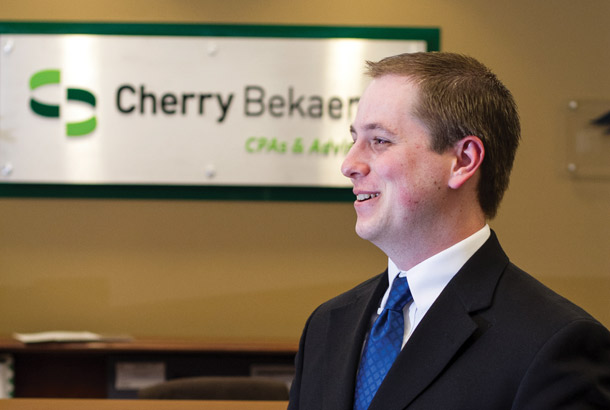One thing EMU recent accounting graduates often mention about the university’s accounting program is how they benefitted from its small size.
Ashley Hevener ’10 said the close, first-name relationship with her professors was a key part of the education that serves her well in her job as an auditor in Alexandria, Virginia, with Kearney & Company, a firm that focuses on federal agencies.
“EMU is doing a great job of preparing students to get the CPA certification,” said Jonathan Beckler ’07, now a senior accountant with Cherry Bekaert LLP in Atlanta, Georgia, echoing a sentiment expressed by many of his peers. In nearly every state, though, the boards that regulate the accounting profession have adopted policies requiring CPA aspirants to have completed 150 collegiate credit hours – basically a year of academic credit beyond the usual four undergraduate years – before they can be licensed as a CPA, even if they pass the CPA exam.
Virginia adopted such a policy in 2005, meaning that accounting majors in the years since who want to become CPAs in Virginia – and pretty much any other state – have needed to continue their education at the graduate level.
Enter the master’s of accounting program at James Madison University (JMU), just across town from EMU. JMU has a 30-hour master’s program in accounting. EMU and JMU have formed a strong partnership in recent years, giving EMU accounting majors ready access to a one-year graduate program in Harrisonburg that gives them enough credit to sit for the CPA exam.
“Many of our students go to ‘finishing school’ at JMU,” says Ronald L. Stoltzfus ’75, PhD, head of the accounting program in EMU’s business and economics department. “We give them a good foundation, but our offerings are limited. JMU has the resources to offer graduate-level training in taxes, auditing and other aspects of accounting.”
Stoltzfus does recall one honors student, Eric Yoder ‘11, who chose not to enter graduate school and is now a CPA employed by Brown, Shultz, Sheridan and Fritz in Camp Hill, Pennsylvania. Yoder, however, came to EMU with 20 hours of college credit earned while in high school. This allowed him to take a few extra college courses and continue on to the CPA exam and licensing.
“All of the EMU students we have had in our program have been successes,” said Paul Copley, PhD, director of JMU’s School of Accounting. “They have been great in the classroom, have all found jobs, and have all passed the CPA exam. This is a testament to the quality of the undergraduate program at EMU.”
Besides his own JMU undergraduate pool, Copley says EMU is the only university from which his master’s program actively recruits candidates; each year one or two EMU graduates typically enroll. The master’s program at JMU allows students to specialize in taxation, audition or information systems.
While EMU’s small program size allows students to develop close, beneficial relationships with professors, being small also keeps it off the recruiting radars of large accounting firms. The fact that dozens of employers recruit from the graduate program at JMU – a public university with an enrollment of nearly 20,000 students – makes it an even more attractive option for EMU graduates looking for a first job opportunity.
“JMU has superior recruiting power for business and accounting students,” said Monte Glanzer ’07, who connected with his current employer, the accounting firm Hantzmon Wiebel in Charlottesville, Virginia, through one of his graduate professors at JMU.
As Copley puts it, the presence of JMU’s master’s program in Harrisonburg gives EMU accounting students access to the “best of both worlds.” Beckler agreed, describing his undergraduate study at EMU as a great foundation on which the master’s program at JMU laid the finishing touches that prepared him for a career in accounting. — Andrew Jenner ’04
